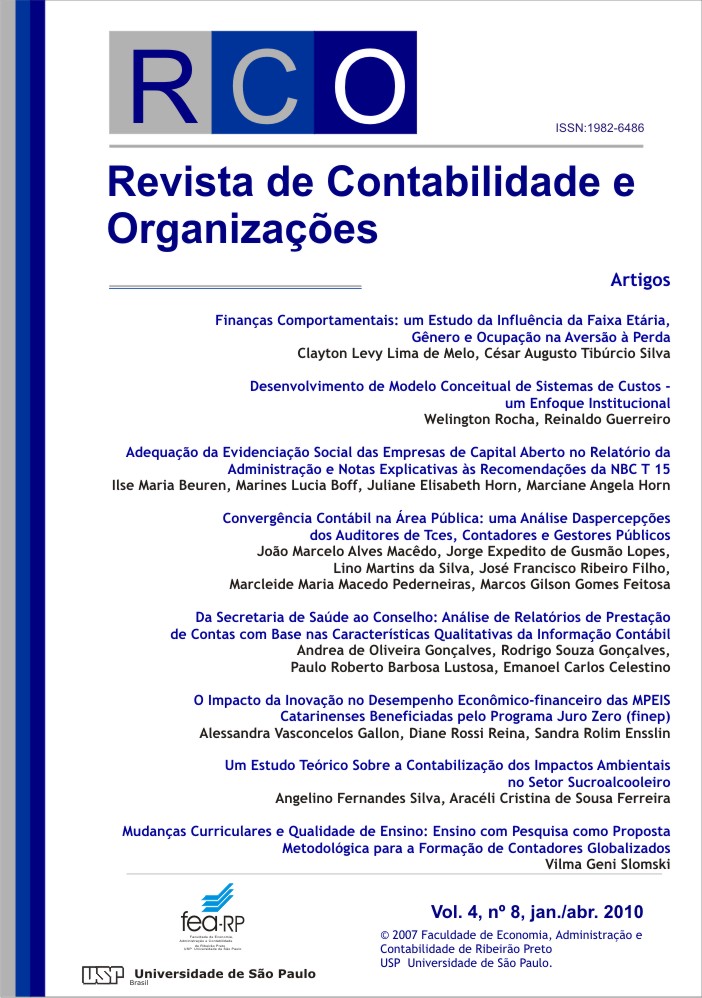A theoretical study on the accounting of environmental impacts in sugarcane sector
DOI:
https://doi.org/10.11606/rco.v4i8.34762Keywords:
accounting of environmental, sugarcane sector and environmental impactsAbstract
The objective of the present study is to demonstrate the main environmental impacts of ethanol production derived from the sugarcane and to propose the disclosure of environmental costs of sugarcane sector in the financial statements based on the existent methods of environmental valuation. The results were obtained by utilizing the strategy of descriptive research and bibliography review. The main environmental impacts of the sugarcane sector are: the decrease of the hydric availability resulting from the induction of erosive processes and of the superficial reception of water, the straw of the sugarcane burned, the unconscious discard of the vinasse in nature, the loss of soil productivity, of the biodiversity and climate change. Among the economic valuation methods that can be applied within environmental impacts stand out the cost of control, replacement cost, opportunity cost, marginal productivity, contingent valuation method, avoided costs and market surrogates goods. It is noteworthy that sugarcane sector is a great economical force of Brazil and since a long time ago, the factories of sugar and alcohol are developing and applying measures that have been minimizing the environmental impacts of its production.Downloads
Downloads
Published
Issue
Section
License
The RCO adopts the Free Open Access policy, under the standard Creative Commons agreement (CC BY-NC-ND 4.0). The agreement provides that:
- Submission of text authorizes its publication and implies commitment that the same material is not being submitted to another journal. The original is considered definitive.
- Authors retain the copyright and grant the journal the right of first publication, with the work simultaneously licensed under the Creative Commons Attribution License which allows the sharing of the work with acknowledgment of authorship and initial publication in this journal.
- Authors are authorized to take additional contracts separately, for non-exclusive distribution of the version of the work published in this journal (e.g. publish in an institutional repository or as a book chapter), with necessary recognition of authorship and initial publication in this journal.
- Authors are allowed and encouraged to publish and distribute their work online (e.g. in institutional repositories or on their personal page) before or during the editorial process, as this can generate productive changes as well as increase the impact and citation of published work (See The Effect of Free Access).
- The journal does not pay copyright to the authors of the published texts.
- The journal's copyright holder, except those already agreed in the Free Open Access Agreement (CC BY-NC-ND 4.0), is the Accounting Department of the Faculty of Economics, Administration and Accounting of Ribeirão Preto of the University of São Paulo.
No submission or publication fees are charged.
Up to 4 authors per article are accepted. Exceptionally duly justified cases may be reviewed by the Executive Committee of the RCO. Exceptional cases are considered as: multi-institutional projects; manuscripts resulting from the collaboration of research groups; or involving large teams for evidence collection, construction of primary data, and comparative experiments.
It is recommended that the authorship be ordered by contribution of each of the individuals listed as authors, especially in the design and planning of the research project, in obtaining or analyzing and interpreting data, and writing. Authors must declare the actual contributions of each author, filling the letter to the editor, at the beginning of the submission, taking responsibility for the information given.
Authors are allowed to change throughout the evaluation process and prior to the publication of the manuscript. The Authors should indicate the composition and final order of authorship in the document signed by all those involved when accepted for publication. If the composition and authoring order is different than previously reported in the system, all previously listed authors should be in agreement.
In the case of identification of authorship without merit or contribution (ghost, guest or gift authorship), the RCO follows the procedure recommended by COPE.








